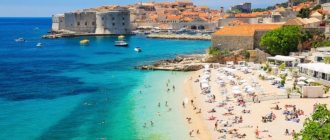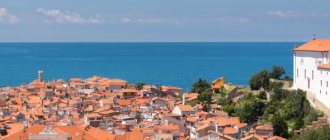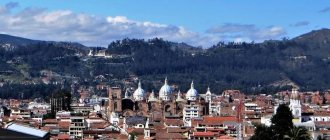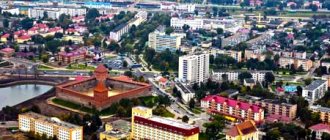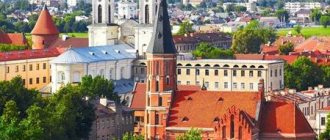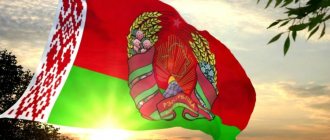Pros and cons of moving to Croatia
Having been on vacation at least once in a good place, you can quickly get excited about the idea of going there for permanent residence. But impressions can be deceiving, and in real life everything may not turn out to be colorful. Before immigrating to Croatia from Russia, you should weigh all the pros and cons of moving.
Pros:
- Wonderful climate. Every person will be able to find comfortable conditions here. Part of Croatia is located on the Adriatic coast, so it is dry and hot most of the year (average temperature is +23-25 degrees), and in winter there is no sub-zero temperature (the thermometer stays at +5-10 degrees). The central regions are cooler, but in winter the temperature does not drop below -5 degrees. The only exceptions are mountainous areas, where winters are usually snowy.
- Good ecology. Clean air, clear sea, a large number of protected areas that people do not touch. All this contributes to the health and longevity of local residents, because the average life expectancy of Croats is 78 years.
- National language. The Croatian language belongs to the Slavic language group. Its pronunciation is close to Russian, so it can be learned fairly quickly. But even without this, difficulties rarely arise - most local residents speak Russian.
- High quality of life. Comfort and safety, environmentally friendly products, affordable medicine. In addition, Croatia has a very low crime rate.
- Friendly people. Croatians are friendly towards visitors and treat Russians well, so integrating into a new culture and society is quite easy.
The advantages of moving to this country are very tempting, but as with everything else, there are some disadvantages:
- Residence permits are not easy to obtain. In order to legally reside in Croatia for several years, you must have compelling reasons and financial well-being. Paperwork will have a significant impact on the budget.
- High prices. Quality products and good clothes are not cheap. Local residents even go specifically to shopping in neighboring countries. The Croats are trying to get their monetary benefit from everything. And although the standard of living in this country is the highest in all the Balkans, even relative to it the prices seem high.
- Taxes. Residents have to give approximately ⅓ of their earnings to the state. At the same time, many cannot even name what exactly the collected funds are spent on.
- Corruption. The level of corruption here is the same as in Russia. If necessary, many problems can be solved with the help of useful “connections”.
- No central heating. Although this is typical for many countries in Europe, a lot of money will be spent on utilities in the winter season - approximately 150 euros per month.
Available ways to immigrate to Croatia from Russia
Emigrating from Russia to EU countries is a difficult decision that must be carefully considered. You need to be prepared to spend your time and money on paperwork.
To enter the country, you must apply for a visa by contacting the Croatian Embassy in Moscow. You can do this yourself or use the services of specialized agencies that are accredited.
There are several legal ways to move to Croatia for permanent residence.
Buying a property
Currently, purchasing real estate in Croatia with the expectation that this will facilitate the process of obtaining a residence permit is pointless. The fact that a foreigner owns housing or another object of this state will not affect the decision of the consulate in any way.
Many real estate investors have been turned away for a number of other reasons. Only half of them managed to achieve a positive decision. Therefore, if there is a desire and funds for large purchases, people try to open their own business in Croatia.
Marriage
Marriage with a national is the basis for obtaining a residence permit, and subsequently citizenship. It can be issued after 5 years spent in legal marriage.
Marriage with a foreigner is a common occurrence these days. It can be concluded both in Croatia and in Russia. To register a marriage in Croatia, you must submit documents 1-1.5 months before the wedding day. These include:
- copies of passports of future spouses;
- a certificate stating that the foreigner is not married (with an apostille);
- birth certificates;
- copies of witnesses' passports.
After marriage, the partner of a Croatian citizen can apply for a residence permit for a period of 1 year; after the expiration of the period, he has the right to extend it.
This method is very popular for fictitious marriages, which are concluded only for the sake of obtaining a residence permit. But migration services have developed their own system for checking unions for authenticity, so this should not be abused.
Business immigration
Croatia is very attractive for businessmen, because the standard of living here is good, and therefore the solvency of the population is also good. In addition, after the country joined the EU, the rules for accepting immigrants became stricter, and starting your own business became the most successful way to obtain a residence permit.
According to the law, a business owner can open his own business with 100% authorized capital of at least 2800 euros, but the more the better. It is necessary to provide a business plan for the enterprise and indicate the scope of its activities. Such registration will cost from 1000 to 4000 euros. A businessman must pay all taxes and submit quarterly reports to the tax authorities on time. A profitable business will allow you to obtain a residence permit for a period of 1 year, which can be extended if the business is not closed.
A few more requirements that foreign founders of new companies should take into account:
- positive balance of activity;
- providing jobs for local residents (more than half of all employees must be Croats);
- The salary level of employees should be above the national average.
Employment
Getting a job in Croatia is also not the easiest way to obtain a residence permit. Getting a job without having special skills that will prove your uniqueness is not easy. The country is interested in unique and highly qualified specialists in various fields.
For example, in Croatia there is a demand for IT specialists, for blue-collar jobs with difficult working conditions; doctors and journalists are also required (you can get a patent for this activity). The average salary in the country is 1200 euros. Doctors and programmers can easily earn 60% more than the average salary.
It should be taken into account that Croatia has high tax rates, i.e. after deducting them, the employee will receive not 1200 euros, but approximately 700-800.
If the conditions suit you and you manage to get such a job, then you will need a work visa to move. For its approval, you must also attach an official invitation to work or an already concluded contract. And from the state register of Croatia you will need to obtain an extract that this enterprise is actually registered and operates in the country.
This method of obtaining a residence permit is quite common, so many foreigners turn to agencies to find work abroad. You need to be careful with such organizations, because there are quite a lot of scammers operating in this area.
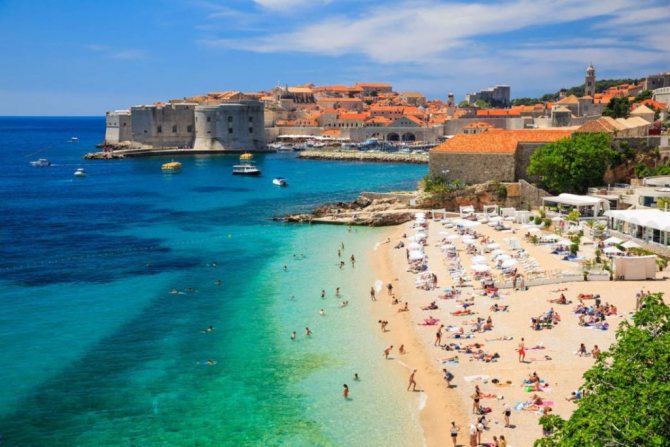
Studies
Croatian education is considered one of the best in Europe. The country's universities open their doors to foreign students every year. Those, in turn, are also interested in enrolling because they can receive a European-style diploma, which will open many doors.
This is one of the cheapest and most promising ways to obtain a residence permit for young, proactive and ambitious people. The cost of training can range from 800 to 4000 euros per year, depending on the specialty. Humanists pay the least for their education, and doctors pay the most.
To enter a Croatian university, you need to pass exams at the end of school (possibly in your home country). Then you need to pass a language test and provide a certificate with grades. If the student is enrolled, he will receive a temporary residence permit for a period of 1 year, which can be extended. To obtain a permanent residence permit, you must live in the country for at least 5 years, but, unfortunately, the time you study at a university is not taken into account. But a local diploma will help you easily find a job in Croatia with a good level of income.
How to become a citizen of Croatia
In order to obtain a residence permit, you need to submit the following documents:
- photos;
- a certificate stating that there is a place of residence;
- a certificate that there are financial resources;
- a certificate from the court stating that there is no criminal record;
- birth certificate;
- foreign passport and passport of my country.
I received a residence permit for a year, with the possibility of extending it. All collected documents must be taken to the consulate at your place of residence.
Permanent residence
Such permission can be issued after five years of residence with your temporary residence permit. It turns out that in about 1 year I will be able to obtain permanent residence. There are also the following conditions:
- You need to live in Croatia for 10 months and at least a year, continuously. Every year I had to renew my residence permit.
- Accommodation in Croatia with a work visa.
The following is required:
- international passport;
- employment contract (show that there is income);
- health insurance, as well as social;
- mandatory knowledge, at least basic, of the Croatian language.
And after I receive permanent residence, then I will be able to enjoy the same rights as citizens of the country.
Citizenship
But you can count on citizenship approximately 8 years from the moment the residence permit was received. The main thing is to have a permanent residence permit that is valid.
What is needed to obtain citizenship:
- High level of knowledge of the Croatian language.
- Have no offenses (legal or otherwise).
- Fill out the form.
- To write an application.
- Provide a passport of your country and a foreign passport.
- Write an application for refusal of previous citizenship, since dual citizenship is prohibited.
- Pay the administrative fee.
- Have documents confirming permanent residence.
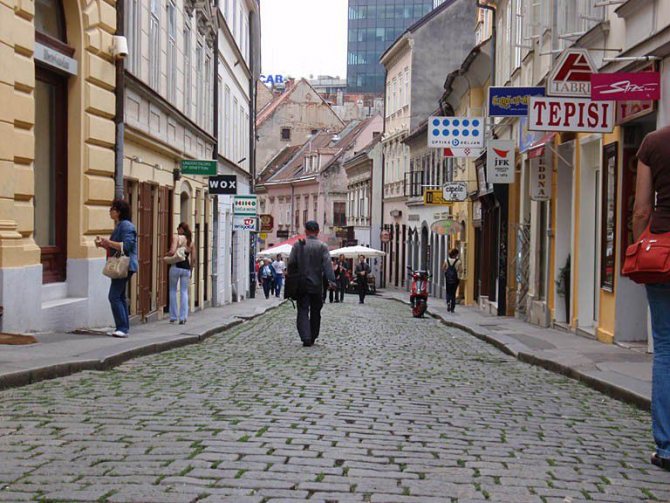
Streets of Zagreb.
The process of obtaining a residence permit
Immigration to Croatia consists of three stages:
- Obtaining a long-term visa to enter the country (also known as a temporary residence permit for up to 1 year).
- Obtaining a temporary residence permit.
- Obtaining a permanent residence permit.
- Obtaining citizenship.
To obtain a temporary residence permit, you must have compelling reasons and prepare a package of documents, which will be reviewed within 2-3 months. The cost of temporary and permanent residence permit will range from 500 to 2500 euros per person.
These documents include:
- visa category D;
- health insurance policy;
- availability of a place of residence (can be confirmed by a document confirming a hotel room reservation or a rental agreement);
- certificate of no criminal record;
- confirmation of the basis for long-term stay in the country;
- a certificate of availability of funds in a bank account that can provide at least 2 months of stay in the country.
Before the expiration of the residence permit, you must take care of its timely renewal. To do this, it is enough to prepare a similar package of documents.
Foreigners who have lived on its territory for the last 5 years have the right to obtain permanent residence in Croatia. The applicant must have a regular source of income, a place of residence, and a health insurance policy to receive treatment services. A person must collect the necessary package of documents.
This package includes:
- application in Croatian;
- international passport;
- 2 photos;
- medical insurance;
- confirmation of the state of well-being (bank statement on account balance, salary certificate);
- documents confirming education;
- certificate of no criminal record;
- documents providing grounds for long-term stay in the country;
- evidence of repayment of all debts in your home country.
The entire package must be translated into Croatian and certified by a notary. It is necessary to prepare not only the originals, but also copies of these documents.
Based on the results of their consideration, the decision is entered with a note in the international passport: approved or denied. Children who live in Croatia with a parent receive permanent residence status automatically upon approval of the parent's application.
The final stage of immigration is obtaining Croatian citizenship. You can apply for it after living in the state for 10 years (in some cases, 5 years is enough). By this time, a foreigner must have a high level of knowledge of the Croatian language, know the main aspects of local legislation, and have an understanding of the culture of the country.
The only difficulty may be that the person will have to renounce Russian citizenship. Therefore, all documents required for a residence permit are supplemented with a certificate from the Russian Consulate on the renunciation of Russian citizenship.
Children can receive citizenship automatically if at least one of the parents is Croatian.
How to move to Croatia for permanent residence from Russia
Emigration to Canada
A visitor who has lived on its territory for at least five years can obtain permanent residence in the country. For a foreigner who marries a Croatian, this period is reduced to three years. In order for the country's government to approve an application, you need to have a stable income, living space and a medical insurance policy. Children who have not reached their 18th birthday acquire permanent residence automatically with their parents.
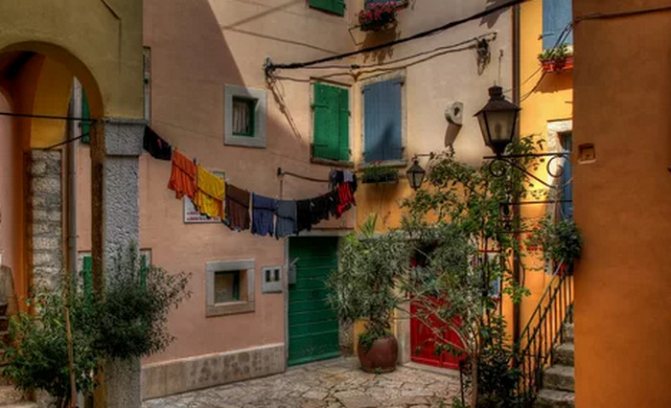
Permanent residence in Croatia
After approval of the acquisition of permanent residence, a corresponding mark is placed in the international passport.
Reviews from Russians who have moved
When making a serious and responsible decision about whether to move to Croatia, you can ask for the opinions of former compatriots. But it is worth remembering that this is the experience of a specific person with his own views and values, yours may differ. Below are some of the reviews.
Medvedeva Elena, 32 years old, Zagreb:
“We had to spend a lot of money to emigrate from Russia, but it was worth it. I received a temporary residence permit in connection with my marriage to a Croatian. Our future child will immediately become a citizen of Croatia. I also plan to get it in the future. For now, the only thing that scares me is whether I will be able to learn the legal norms, history and traditions of the country. Everything works out well with the language.”
Lapaev Evgeniy, 28 years old, Zadar:
“My immigration journey began when I came to Croatia to study. My parents managed to pay for my studies, and now I am building a fairly successful career as a doctor in a private medical center. It was difficult to study, because there were difficulties with the language in the first years, but it was worth it. Soon I will be able to obtain a permanent residence permit, because the first years of study were not included in the calculation of my period of residence here.”
Nikolaev Oleg, 69 years old, Varazdin:
“Croatia is a calm country. It is ideal for enjoying a happy retirement here. My wife and I succeeded because we bought a home in Split. Now we rent it out to tourists, it brings in good income. I also like the fact that at any moment we can break away and go traveling around Europe. Recently we went to Austria again. To be honest, we don’t even miss Russia, we feel so comfortable and calm here.”
Before making the final decision to move to Croatia for permanent residence, you should carefully weigh all the pros and cons for you personally. You should not be fascinated only by nature and the favorable climate; what is much more important is what standard of living you can provide for yourself in the new country.

